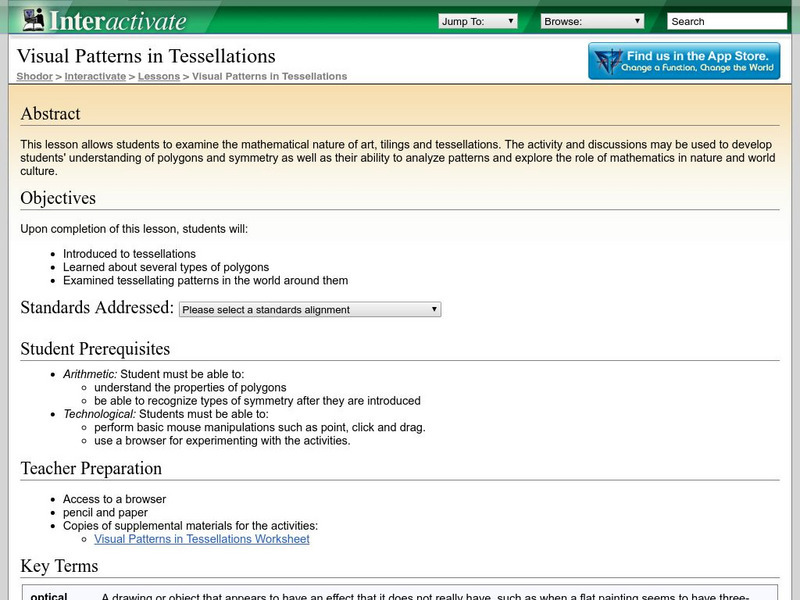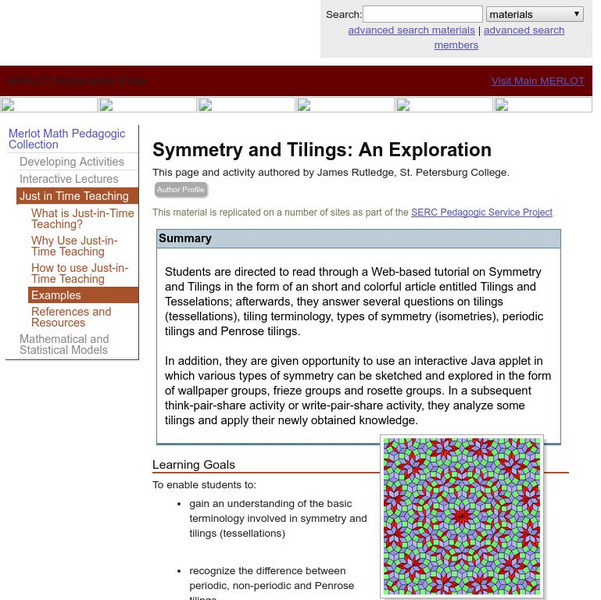Hi, what do you want to do?
Curated OER
Tessellating Tiles
Second graders Make, name and describe, using their own language and the language of geometry, everyday shapes and objects. They create and talk about geometric patterns which repeat (show translation), or which have rotational or...
Curated OER
Tantalizing Tessellations - Lesson I
Students complete a chart (KWL) as a pre-assessment, study the history of tessellations (tilings), investigate the properties of tessellations, and make and evaluate photographs of "found tessellations" for a PowerPoint/HyperStudio...
Curated OER
Back to the Bees (Tesselations)
Sixth graders observe the creation of a tessellation with hexagons. In groups, they work with polygons to discover what shapes can be used to create tessellations and explore the angle measurements of each shape. Using internet websites,...
Curated OER
Tessellations and T-Shirts
High schoolers combine the visual arts and technology with mathematics in the creation of these beautiful t-shirts. They view examples of the work of artist M.C. Escher.
Creative Educator
Tessellation Sensation
Geometers investigate patterns and symmetry, and examine the artwork of M.C. Escher on the Internet. They compare his style to the floor and ceiling tiles in the classroom. If you have ImageBlender™ software, you could have your...
Curated OER
Math/Quilt Connection
Students explore quilting. In this math patterns lesson plan, students define the perimeter of a quilt border, create tessellations using geometric shapes, and detemine the area of a quilt.
Curated OER
Let's Tesselate
Learners investigate the geometrical concepts of translation, reflection, and rotation. They make different observations looking for the concepts that are displayed in classroom items like floor tiles, carpet designs, and visuals hung in...
Curated OER
Tessellations
Learners create tessellations. In this math lesson, students explore symmetry and patterns through the creation of a tessellation. Learners design and create their own tessellation.
Curated OER
Tessellation Trial and Error
In this interactive activity, students review attributes of equilateral polygons. They are introduced to the concept of a tessellation. Using protractors and pre-cut shapes, students arrange a variety of tiles to create tessellations....
Curated OER
Family Activity: Triangles and Quadrilaterals
In this triangles and quadrilaterals worksheet, students solve 7 short answer problems. Students find objects around the house that are constructed from triangles, parallelograms, trapezoids, squares, rectangles. Students sketch the...
Curated OER
Polynominoes
In this polynominoes worksheet, 10th graders solve 9 different problems relating to various types of polynominoes, such as triominoes and tetrominoes. First, they determine how many different types of triominoes they can locate and draw...
Curated OER
Math is Beautiful: Tessellation
Students examine patterning in Chinese and Japanese artwork prior to creating their
own tessellations using styrofoam plates in this creative cross-curricular instructional activity for upper-elementary/middle level classrooms.
Curated OER
Tiling the Plane
Learners use pattern blocks and triangular grid paper to review shape names, be introduced to the concept of a tiling of the plane, and determine which pattern blocks tile the plane. They are asked: "Have you ever seen a floor or a wall...
Curated OER
Cutting Up in Class, Fractal Style
Learners create three-dimension models demonstrating exponents, multiplying and dividing of fractions, and the use of repeating patterns in tessellations, mirror images, and tiling.
Curated OER
Transforming Triangles
Sixth graders graph translations (slides) and reflections (flips) on a coordinate plane. They visualize and identify geometric shapes after applying transformations on a coordinate plane. Finally, 6th graders write a paragraph telling...
Curated OER
Problem Solving Strategy: Make a Model
In this problem solving strategy worksheet, students complete a graphic organizer to help solve a problem. Students complete 4 sections: understand, plan, solve and look back. Houghton Mifflin text referenced.
Curated OER
Mosaics of Cyprus
Students create digital mosaics. In this visual arts lesson, students discover the attributes and history of mosaics in a teacher-led discussion. Students use an educational program to make their own digital mosaics.
Curated OER
Pixel Mosaic
Students discuss current knowledge of pixels. They listen as the teacher explains their importance in picture clarity. Students view the "Pixel Mosaic Animated Movie." Students receive pieces of pictures and matching tiles which...
Curated OER
The Great Cover Up!
Young scholars use non-standard measurement tools such as body parts, beans and counters to find the area of shapes drawn on the floor. They continue to determine the area of other objects in the classroom.
Curated OER
The Clumsy Tiler S
Fourth graders solve a series of parallel problems. They use statistics, geometrical, and numerical aspects to solve the problem. Students create a pattern that answers the problem.
Curated OER
Scenes of the Earth
Students examine and study how changes in perspective can change the way that they can observe objects. They explore the relationship between a scene's area and its detail. Each student looks at the ground through cardboard tubes from...
Incredible Art Department
The Incredible Art Department: Art Tessellations
Looks at tessellation artists, including M.C. Escher, Robert Fathauer, and Roger Penrose. This is followed by a discussion of fractals and their similarities and differences to tessellations, and links to lessons and resources on...
Shodor Education Foundation
Shodor Interactivate: Lesson: Visual Patterns in Tessellations
This upper elementary and middle school lesson plan examines the mathematical nature of art, tilings and tessellations. Students will also explore polygons, symmetry, analyze patterns and explore the role of mathematics in nature and our...
Science Education Resource Center at Carleton College
Serc: Merlot Mathematics Portal: Symmetry and Tilings: An Exploration
A geometry lesson where learners read about tilings and tessellations, answer some questions, then explore them using an online interactive. Afterwards, they share and apply their learning in discussion and by examining other tilings.




























